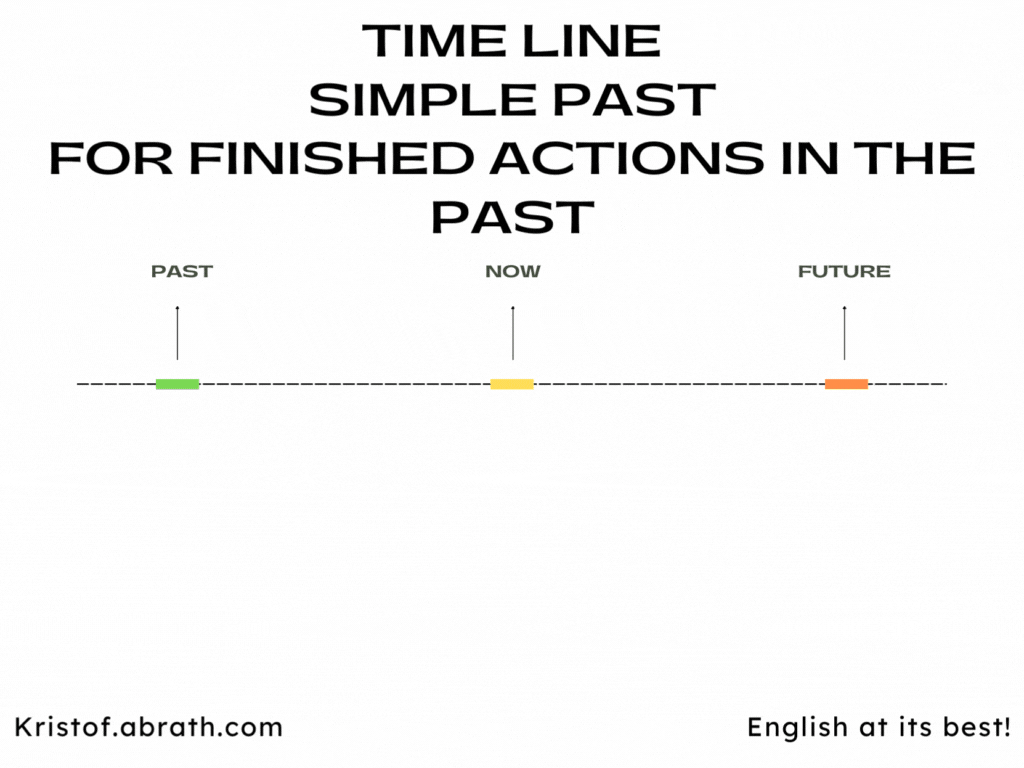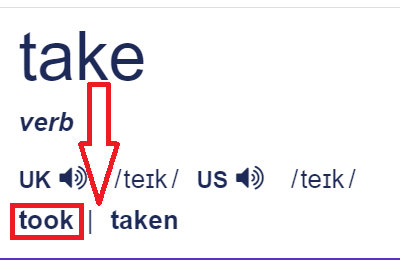Simple Past
Finished actions in the past

Table of Contents
Overview
In this grammar section we will have a look at the Simple Past tense to talk about finished actions in the past.
The video gives an overview of the Simple past for actions that finished in the past.
- It shows the form: how to construct the simple past positive, negative and question form and the exceptions. It also has a look at the placement of adverbs.
- It shows the meaning/usage: when and why to use the simple past
- It shows the pronunciation of the simple past: How you would pronounce different parts of the past simple.
Examples
A: Yesterday I watched a movie.
B: Did you like it?
A: No, I didn’t like it at all.
Usage/ Meaning
How and when do we use the simple past?

Simple Past is used to talk about an action finished in the past
Yesterday evening I had dinner, watched a movie, brushed my teeth and went to bed.
This is something the person did yesterday = yesterday is finished, we are now today = all actions are finished in the past.
Form
How do we make, form, construct the Simple Past?
Positive
Examples
- I worked
- She played computer games
Positive:
- I worked
- You worked
- he/she it worked
- You worked
- They worked
- We worked
I/You/ She/ He / It /They/We Subject + infinitive (without to) + ed
Exceptions
- Final letter before Y is a consonant
- to study: She studied
- to worry: he worried
- y changes into ied
- to study: She studied
- Final letter before Y is a consonant
- Verbs ending in e
- to Arrive: I arrived
- to change: They changed
- only add d not ed
- verbs with vowel + consonant ending : consonant doubles
- to stop: I stopped
- to travel: she travelled
- to plan: we planned
Exceptions
- to fix: She fixed ending in x
- to bow: they bowed ending in w
- to benefit: we benefited stress on the first syllable
- to Picnic: you picnicked ending in c +ked
- to fix: She fixed ending in x
Exceptions
Irregular verbs: English has a lot of irregular verbs for simple past. There are no rules for this. The only thing you can do is memorise them.
- Do: did
- go: went
- be: was / were
- have: had
- ….

You can find the Simple Past of irregular verbs in a good dictionary:
https://dictionary.cambridge.org/dictionary/english/take
Or some of them are usually in the back of your English coursebook.
Practice
Simple past regular
Simple past irregular
Simple past regular and irregular
Negative
Examples
- I didn’t work
- We did not play computer games
- She didn’t read books
- He did not speak English
Pronoun | Short form | Long form |
I | didn’t work | did not work |
you | didn’t work | did not work |
she/it/he | didn’t work | did not work |
you | didn’t work | did not work |
they | didn’t work | did not work |
we | didn’t work | Do not work |
I/you/she/it/he/they/we didn’t + infinitive (without to): didn’t work
Practice
Question
Examples
- Did you work?
| Did | Pronoun | Infinitive |
Did | I | work |
Did | you | work |
Did | she/it/he | work |
Did | you | work |
Did | they | work |
Did | we | work |
Did + I/you/he/it/she/they/we + infinitive (without to): Did you work?
NOT Did you worked!
Practice
Short answer
- Yes, I did.
- Subject + did.
- No, I didn’t
- Subject + didn’t
Pronunciation
How do we pronounce different parts of the simple past?
The ed in simple past regular verbs has 3 different pronunciations: /t/ /d/ /ɪd/
When the sound before the ed is a non vibrating sound you use the non vibrating /t/ sound
- I worked
- you stopped
- she watched
- we missed
When the sound before the ed is a vibrating sound you use the vibrating /d/ sound
- I grabbed
- he learned
- She loved
- You smiled
- She played
When the sound before the ed is a /t/ or /d/ sound you use the /ɪd/ sound
I wanted /t/
you decided /d/
She started /t/
we ended /d/
Time words
Which time words/expressions and adverbs can you use with the simple past?
The present simple is often used with these time words
Yesterday I woke up at 6. I woke up at 6 yesterday.
At the weekend I slept till 9. I slept till 9 at the weekend.
On Sunday I cleaned the house. I cleaned the house on Sunday.
Last week I went shopping. I went shopping last week.
2 weeks ago I went to a restaurant.I went to a restaurant 2 weeks ago.
There are also other time words and phrases and you can put them at the beginning or the end of your sentence.
Which adverbs can be used with the simple past?
- Sometimes I took the car to work.
- I sometimes took the car to work.
- I took the car to work sometimes.
You can put sometimes at the beginning, the middle or end, but most common would be at the beginning or middle.
Adverbs positive
- I usually took the bus to the shop. I was usually on time.
- I always arrived on time. I was always happy.
- I never walked to work. I was never late.
- I often ate lunch at work. I was often angry.
- I rarely went to a restaurant. I was rarely sad.
Adverbs usually go before the main verb or after the verb to be.
Questions
Have a look at the questions and write your answers in the comments below. Also give us some more details about when, where, why,….
- Did you play any sports when you were younger?
- Did you cook dinner last night?
- When was the last time you went to a restaurant?
- What was your favourite subject as school?
- When was the last time you went shopping?
- Did it rain yesterday?
- Did you exercise last weekend?
- When was the last time you saw your friends?
- What did you have for breakfast?
- Did you watch TV yesterday evening?
Spread the word
Kristof Abrath
Teacher, Trainer, Course Designer
Teaching in English on 4 different continents since 2006.



